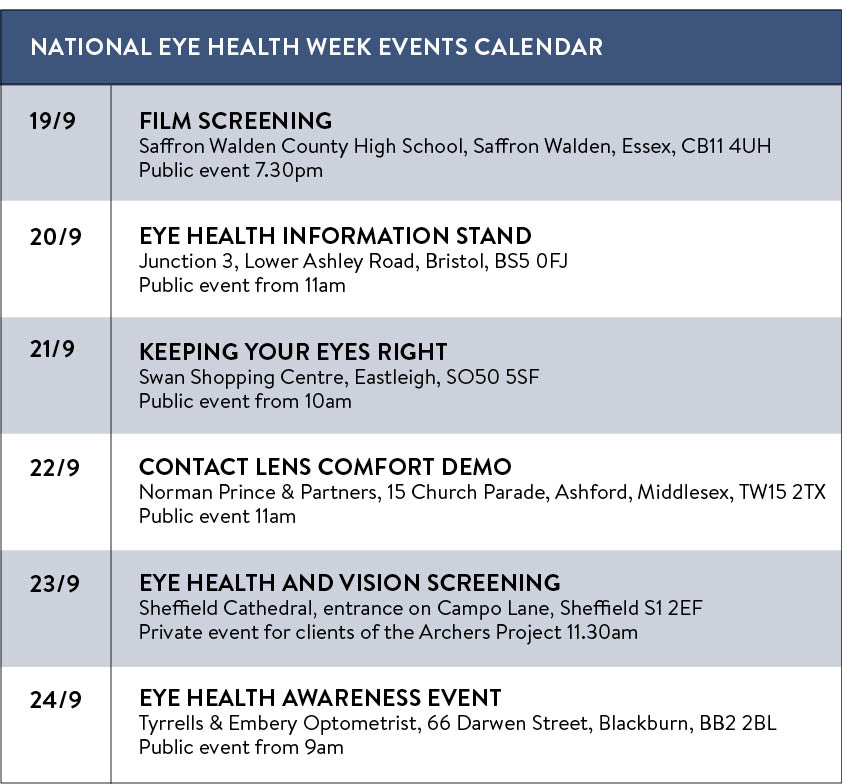An ageing population and unhealthy lifestyles are fuelling a rapid decline in our eye health. Right now there are two million people in the UK living with sight loss and forecasters predict a further quarter of a million could lose their sight by the year 2020.
Good eyesight plays a vital role in our general wellbeing as the quality of our vision affects almost every aspect of our daily lives from work, relationships and mobility to our social and mental wellbeing. A recent report by the Thomas Pocklington Trust reveals people with sight loss are at significantly greater risk of suffering depression.
Yet many people don’t take time to think about the importance of caring for their eyes and even fewer take steps to help prevent future sight loss.
Early detection and treatment of common eye conditions is vital. According to the Royal National Institute of Blind People (RNIB), half of all sight loss is avoidable; however, many of us are reluctant to get our eyes checked until we notice that our sight has declined, at which point irreparable damage may already have been done.
Poor uptake of sight tests is probably the biggest risk to the nation’s eye health – 20 million of us fail to have regular sight tests and one person in ten has never had an eye examination.
National Eye Health Week seeks to raise public awareness about the need to make sight tests a part of your routine healthcare
A simple sight test can detect eye disease, such as glaucoma, years before you notice lost vision and childhood eye conditions such as squint or amblyopia (lazy eye) can be permanently corrected if diagnosed early enough.
A sight test can also spot other health conditions such as high blood pressure, raised cholesterol, diabetes and increased risk of stroke.
National Eye Health Week seeks to raise public awareness about the need to take care of your eyes and make sight tests as much a part of your routine healthcare as having dental check-ups or a smear test.
Getting your sight tested is easy – there are qualified optometrists on almost every high street and, for many of us, it’s absolutely free.
More than 30 million people are eligible for free sight tests paid for by the NHS, and millions more are entitled to tests and prescription eyewear paid for by their employer.
Regular sight tests are particularly important for children, the over-60s, people with a family history of eye disease, those with underlying systemic health conditions, such as diabetes and people of certain ethnic origins who have an increased risk of eye disease.
Adopting healthier lifestyles
National Eye Health Week also aims to encourage people to adopt healthier lifestyles to benefit their eye health.
Worryingly, 93 per cent of us fail to lead a healthy enough lifestyle missing the health targets – not smoking, drinking responsibly, high fruit and vegetable consumption, not diabetic, healthy weight, normal blood pressure and cholesterol – measured by the Health Survey for England.
National Eye Health Week aims to encourage people to adopt healthier lifestyles to benefit their eye health
The relationship between smoking and sight loss is as strong as the link between smoking and lung cancer. However, awareness of this link among the UK’s ten million smokers is low (9.7 per cent) compared with lung cancer (92.2 per cent) or heart disease (87.7 per cent).
Smoking is the biggest modifiable risk factor of sight loss with smokers risking blindness even if they are not genetically pre-disposed to it.
Any amount of smoking, even light, occasional or second-hand, can affect your eye health and increase your chances of suffering sight-threatening eye diseases, including age-related macular degeneration (AMD), ¬ the UK’s leading cause of blindness, or nuclear cataracts, the most common type of age-related cataract, and thyroid eye disease.
Smoking also increases your risk of suffering common eye conditions such as dry eye syndrome, uveitis – swelling of the eye’s middle layer – and impaired colour vision.
Your weight can affect your eye health. A body mass index of 30 or more doubles your risk of AMD and significantly increases your chances of developing cataract.
Early obesity is also associated with diabetes and 60 per cent of people with type 2 diabetes will develop diabetic retinopathy.
Balanced diet
Eating a healthy balanced diet may also benefit your eye health. Eye-friendly nutrients found in many fruits and vegetables, such as spinach, peppers, grapes, broccoli and avocados, can help to protect against AMD.
Cold water fish, such as sardines and tuna, are all excellent sources of essential fatty acids, which have been recommended for the avoidance of dry eye, AMD and generally better health.
Research has shown that eating just one portion of fish a week may reduce your risk of developing AMD by up to 40 per cent.
Protecting your eyes from UV radiation is also vital. According to the World Health Organization, UV damage is the most preventable factor of developing cataracts and around 10 per cent of all skin cancers affect the eyes.
The risks associated with UV exposure are cumulative, so it’s important to protect your eyes whenever the UV index reaches three or more. UV damage can occur even when its cloudy, so everyday UV protection could help you minimise your risk of suffering future sight loss.
During National Eye Health Week, there are activities and events taking place on high streets across the country where you can learn more about the simple things you can do to keep your eyes and vision healthy.

Adopting healthier lifestyles
Balanced diet

